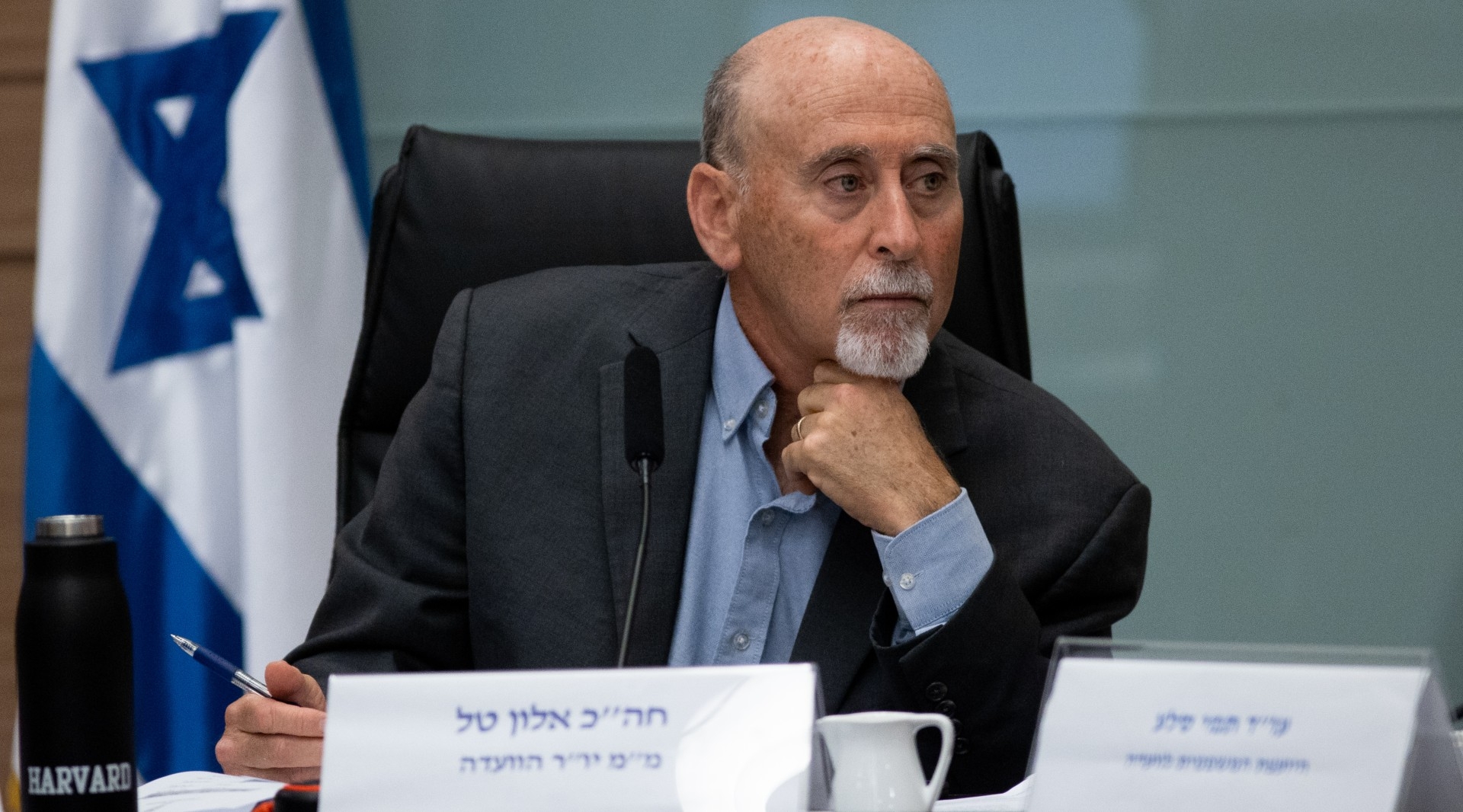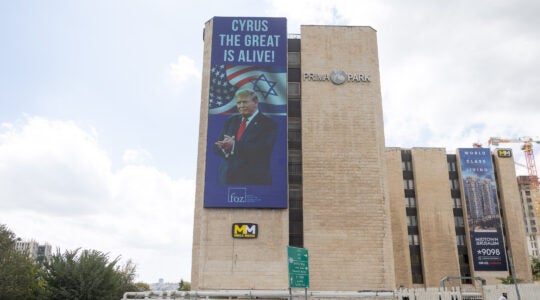Alon Tal is one of Israel’s leading environmentalists and a former member of Israel’s parliament, the Knesset. Now the chair of Tel Aviv University’s Department of Public Policy, Tal will be hosting a landmark conference at Stanford University in late May on lessons from Los Angeles and Tel Aviv in climate resilience and local government policy.
Tal recently sat down for an interview to discuss Israel’s environmental record, what he learned from his time in government and why young American Jews should consider moving to Israel. The interview has been lightly edited for length and clarity.
Is now a time for optimism or despair over Israel’s environmental record?
These are the worst of times and the best of times. Worst, because there’s a minister of environment who is very weak, and many key environmental protections have been eviscerated by the government. Israel’s performance in climate mitigation, moving to renewable energies, is pitiful — just 12% when some countries are 70%. Biodiversity is losing out as every year 20-30 kilometers of open space is lost to development. This reflects a real failure of political will on environmental issues.
But at the local level we’re seeing real leadership. At the Tel Aviv municipality, over 30 people work on the environment. The city has undertaken a massive tree planting initiative and started to address the specter of mass flooding. Tel Aviv offers a better environment today than in the past, and the city is among the C40 — the 40 cities most ambitious about climate adaptation.
Given Israel’s current situation, how can environmental priorities be balanced against security needs?
Like every other era since Israel’s birth in 1948, there are always immediate exigencies. When I see government budgets inflated with investment in insignificant initiatives like those of the Ministry of Heritage, massive increases in funding for the ultra-Orthodox even though they don’t bear their burden of defense, and subsidies for West Bank settlements, I think we can find more money for the environment. This government has no excuse.
What gives you hope about Israel’s environmental future?
I pin my hopes on the younger generation. There has been and still is a small minority that thoughtlessly litters, and they have to be hammered harder than ever with enforcement. But I don’t think that reflects the majority of Israelis. There’s a refreshingly high level of environmental literacy and commitment to doing better.
There’s a Hebrew aphorism “What you see from here you can’t see from there.” What did you learn from your time as a Knesset member that you hadn’t necessarily realized before?
First, that the environment in Israel is not a partisan issue, unlike in the United States. When I was in the Knesset, some of my best partners and legislative initiatives were done in full partnership with Likud politicians from the other side of the political spectrum. Ninety percent of Israelis agree about 90% of the challenges. Everybody in Israel loves nature and is proud of the country’s historical environmental achievements in terms of forestation, water management, etc. Let’s take it to the next level.
The solutions to many of the Middle East’s environmental challenges lie in regional cooperation, and this is one area where you’ve built bridges between Israel and its Arab neighbors. How are those relationships weathering the current political climate?
On the bigger picture, we can be grateful that the many countries who have diplomatic relations with Israel have maintained their relations with us. But there’s no question that since this government came into place, the extraordinary momentum in environmental cooperation has evaporated.
For example, we had agreements to export more water to Jordan and import renewable energy. Since the war began we’ve basically seen that freeze. But the pendulum can swing back.
Regional cooperation makes sense economically and ecologically, but we need a government that is more conscientious in this area and have better relations with Jordan and the Palestinian Authority than the current government has.
In 2005, you received The Charles Bronfman Prize – awarded annually to a Jewish humanitarian under 50 whose work has benefited humankind. By that point you’d already founded Adam Teva V’Din-the Israel Union for Environmental Defense, the Arava Institute for Environmental Studies, and EcoPeace Middle East. How did winning the prize in 2005 help turbo-charge your work?
For me, winning the prize constituted huge validation at a relative young age — validation that this complicated dance between academia and civil society, and two decades of efforts to confront foolhardy development, pollution and bad environmental policies, made a difference. The prize winners really do refer to the “Bronfman family,” which has embraced so many of us and our efforts to make the world a better place. It remains a great honor and source of support.
Tell us a bit about this Tel Aviv-Los Angeles conference, and why you’re doing it now.
Los Angles has a history of doing innovative climate initiatives. Tel Aviv is the only Israeli city to have taken the challenge of climate adaptation seriously. These two cities are natural partners.
After the catastrophic wildfires in Los Angeles, it became clear to me that the issue of climate resilience is one no city can afford to ignore. If there are any takeaways from this terrible and tragic chapter in Los Angeles’ history, it’s that at the end of the day, notwithstanding the goodwill of governments, communities are largely on their own when it comes to helping climate crisis victims.
We wanted to create a conference that would bring together experts from Israel and the United States to discuss a pressing environmental issue, where a mutual exchange of ideas would be beneficial. At the May 29-30 conference — which is open to the public — we’ll talk about challenges like sea level rise, ensuring water supply to a city in times of drought, fire prevention, how to address the likelihood of massive increases in heat waves, climate justice and protecting vulnerable populations.
After last year’s turbulence on campus and efforts to delegitimize Israel, it’ll be nice to have a perfectly normal academic gathering in which Israel shares its experiences and also learns from the work and research taking place in the United States. I feel very privileged that Stanford University’s Center on Democracy, Development and the Rule of Law, which has an emerging Israel Studies program led by Larry Diamond, has allowed me to chair this conference. Their support has been extraordinary.
Given everything happening these days, would you encourage young Jews to move to Israel on aliyah, as you did?
Of course! We are privileged to live in an era where there is a Third Jewish Commonwealth. I feel extremely lucky to have been given that opportunity. Israel is a remarkable land of an opportunity; it’s not an ossified place.
Young American Jews need to come and bring their values of environmentalism and commitment to democracy, and they will be welcomed, as I was.
JTA has documented Jewish history in real-time for over a century. Keep our journalism strong by joining us in supporting independent, award-winning reporting.
This story was sponsored by and produced in partnership with The Charles Bronfman Prize, an annual prize presented to a humanitarian whose innovative work fueled by their Jewish values has significantly improved the world. This article was produced by JTA's native content team.
More from The Charles Bronfman Prize





